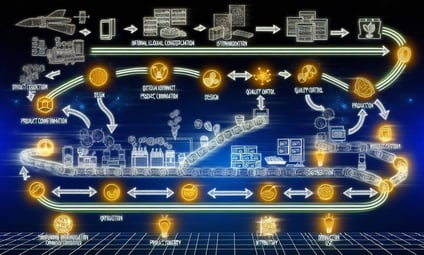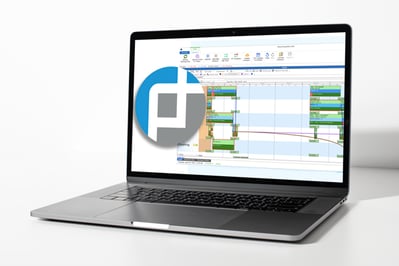Digital Continuity in Product Lifecycle Management
Ensuring seamless operations and optimal product lifecycle management is more critical than ever in food and beverage manufacturing. As a Purchasing Manager, you're tasked with not only sourcing quality materials but also with navigating the complexities of integrating various systems to ensure digital continuity throughout the product lifecycle.
In this blog, we'll look into the concept of digital continuity in product lifecycle management and explore how integration between PlanetTogether and leading ERP, SCM, and MES systems such as SAP, Oracle, Microsoft, Kinaxis, and Aveva can enhance efficiency, streamline processes, and drive success in F&B manufacturing.

Digital Continuity in Product Lifecycle Management
Digital continuity refers to the seamless flow of data and information throughout the entire product lifecycle, from concept to disposal. It ensures that all stakeholders have access to accurate, up-to-date information at every stage, enabling informed decision-making and efficient collaboration.
In F&B manufacturing, digital continuity is particularly crucial due to the industry's stringent regulatory requirements, perishable nature of products, and the need for rapid response to changing consumer demands. From recipe formulation and procurement to production planning and distribution, maintaining digital continuity is essential for maximizing productivity and maintaining quality standards.

Integration between PlanetTogether and ERP, SCM, and MES Systems
PlanetTogether is a powerful production planning and scheduling software that allows F&B manufacturers to optimize their operations, minimize waste, and maximize resource utilization. However, its effectiveness can be further enhanced through seamless integration with ERP, SCM, and MES systems.
SAP
Integration with SAP enables real-time data synchronization between production planning and procurement processes.
Purchasing Managers can leverage SAP's robust procurement capabilities to streamline supplier management, purchase order processing, and inventory control.
Seamless integration ensures accurate demand forecasting, inventory optimization, and just-in-time delivery of materials, minimizing stockouts and reducing carrying costs.
Oracle
Integration between PlanetTogether and Oracle ERP facilitates end-to-end visibility and control over the entire product lifecycle.
Purchasing Managers can utilize Oracle's advanced analytics and reporting tools to gain insights into supplier performance, material costs, and production efficiencies.
Seamless data exchange between systems enables proactive risk management, agile decision-making, and continuous improvement across all stages of production.
Microsoft Dynamics
Integration with Microsoft Dynamics enhances collaboration and communication between production planning, procurement, and sales teams.
Purchasing Managers can leverage Microsoft's intuitive interface and workflow automation capabilities to streamline purchase requisition, approval, and fulfillment processes.
Real-time synchronization ensures accurate demand forecasting, inventory replenishment, and order fulfillment, enabling F&B manufacturers to meet customer demands with agility and efficiency.
Kinaxis
Integration between PlanetTogether and Kinaxis RapidResponse enables dynamic supply chain planning and scenario analysis.
Purchasing Managers can leverage Kinaxis' AI-driven insights and predictive analytics to anticipate market trends, mitigate supply chain risks, and optimize inventory levels.
Seamless data integration ensures synchronized production schedules, procurement plans, and inventory replenishment strategies, enabling F&B manufacturers to adapt quickly to changing market conditions and customer preferences.
Aveva
Integration with Aveva MES enhances visibility and control over shop floor operations, ensuring adherence to production schedules and quality standards.
Purchasing Managers can leverage Aveva's real-time monitoring and reporting capabilities to track material consumption, production efficiency, and downtime.
Seamless data exchange between systems enables proactive problem-solving, continuous improvement, and operational excellence, driving overall performance and customer satisfaction.

Achieving Seamless Integration
While the benefits of integrating PlanetTogether with leading ERP, SCM, and MES systems are clear, achieving seamless integration requires careful planning, collaboration, and execution. Here are some key considerations for Purchasing Managers:
Define Integration Objectives: Clearly define the objectives and expected outcomes of the integration process. Identify specific pain points, such as inventory management challenges or production bottlenecks, that integration aims to address.
Engage Stakeholders: Collaborate with key stakeholders, including IT teams, production managers, and supply chain partners, to ensure alignment of goals and requirements. Involve end-users in the selection and implementation process to foster buy-in and ensure system usability.
Choose the Right Integration Approach: Evaluate different integration approaches, such as point-to-point integration, middleware solutions, or API-based integration, based on your organization's technical capabilities and infrastructure requirements. Consider factors such as scalability, flexibility, and maintenance overhead.
Data Mapping and Standardization: Ensure consistency and accuracy of data across integrated systems by establishing clear data mapping rules and standardizing data formats. Define common data attributes, such as product codes, units of measure, and inventory classifications, to facilitate seamless data exchange.
Implement Robust Data Governance: Establish data governance policies and procedures to maintain data integrity, confidentiality, and compliance throughout the integration process. Implement role-based access controls, data encryption, and audit trails to protect sensitive information and mitigate security risks.
Monitor and Evaluate Performance: Continuously monitor the performance of integrated systems and measure key performance indicators (KPIs) to assess the effectiveness of integration efforts. Solicit feedback from end-users and stakeholders to identify areas for improvement and optimization.
Achieving digital continuity in product lifecycle management is essential for F&B manufacturers to stay competitive, responsive, and resilient in the face of evolving market dynamics. Integration between PlanetTogether and leading ERP, SCM, and MES systems such as SAP, Oracle, Microsoft, Kinaxis, and Aveva plays a critical role in achieving seamless data flow, process optimization, and collaboration across the entire supply chain.
As a Purchasing Manager, embracing digital continuity and leveraging integrated solutions can empower you to optimize procurement processes, enhance supply chain visibility, and drive operational excellence in F&B manufacturing. By embracing digital transformation and embracing integration, you can position your organization for success in today's fast-paced and dynamic marketplace.
Are you ready to take your manufacturing operations to the next level? Contact us today to learn more about how PlanetTogether can help you achieve your goals and drive success in your industry.